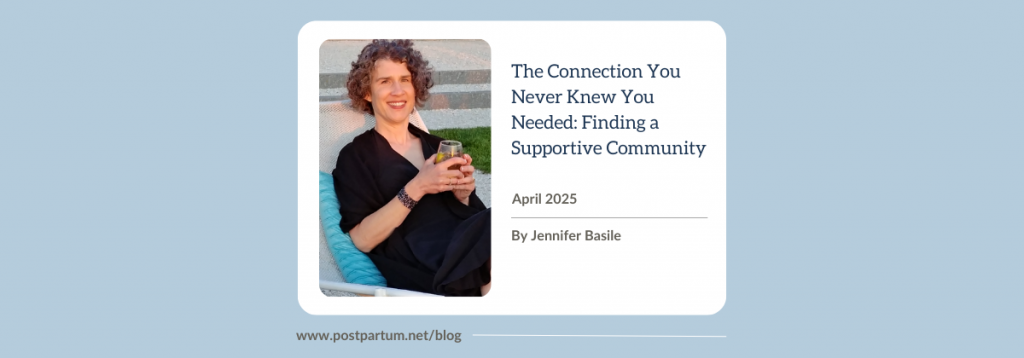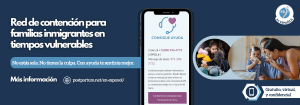By Jennifer Basile
Perinatal mood and anxiety disorders (PMADs) bond survivors in the club to which they never wanted to belong – but the empathy, understanding, and support that can only come from others who have also suffered are unexpected benefits.
The Club I Never Wanted To Be In
When my friend told me I should consider getting help, I was angry.
Me? Need help?
That’s unnecessary.
Just because I thought about cutting my finger off to escape the daily onslaught of an infant, toddler, and preschooler doesn’t mean I’d actually do it.
I’ve got it under control.
But whether I accepted it or not – because the anger was really only masking denial – I was suffering from a perinatal mood disorder. And I most certainly needed help.
Healing Through Connection
Three years later, after continued therapy, lifestyle changes, and a successful medication regimen, I started writing about my experiences. Exploring my pain and sharing it with others was not only cathartic but also helped me connect with so many other mothers who were also struggling. So much so that I decided to complete PSI’s Perinatal Social Support training.
I finished those sessions in June 2015 – just in time to attend the Warrior Mom Conference in Boston. The conference was the first of its kind because it was designed for survivors of perinatal mood and anxiety disorders rather than practitioners.
The fellow bloggers I’d connected with within the world of maternal mental health were extremely supportive and understanding. The staff I’d encountered within and around PSI were so helpful and kind. Everyone I interacted with on the message boards leading up to the conference seemed positive and friendly. But as I boarded the train for my hour ride to Boston, I ruminated.
As a stay-at-home mom to three littles, alone time only happened when I locked myself in the bathroom or stayed up till the wee hours. To get out of the house by myself took a minor miracle. When and if it ever happened, I felt almost naked without the responsibility of a small sweaty hand in mine. To travel solo and convene with a group of people whom I’d never met? I scanned the train nervously for other moms I’d seen online from my area – not that I’d have approached them even if I did recognize them.
The shift happened in the lobby of the hotel earmarked for the conference. Someone much more gregarious than I suggested we meet at an appointed time and walk over to the opening sessions together. That’s where the connections began.
Seated in the sea of chairs set up for welcoming remarks, I felt immersed in the warmth of shared experience. I have never felt that much resonance or connection instantaneously. There was giddiness at the time taken for ourselves; joy at having come through horrible stuff; grief for what we’d lost; gratitude for true empathy – and relief.
Outside this conference hall, survivors of PMADs had to measure the cost and benefit of sharing the reality of their experience. Inside, we could admit things like intrusive thoughts. One woman said she loved how we could trade them like poker players upping the ante: “eah, well, listen to this one.”
Anyone who can use humor to get through the hardest parts of life is my kind of person. And I’d found my people – through the tears, the hands-on-heart, the hugs, and the laughs. We were all very different women, from all parts of the country and even some from others, many races and colors. We learned that even with the shared struggle of PMAD, our path to wellness had different pitfalls. But my mind and heart were opened in so many ways that weekend.
Still riding the wave of newly minted training and energy from the conference, I sent my youngest off to kindergarten that fall and prepared to dig into the advocacy dirt. A month later, I was surprised with a positive pregnancy test. But I was in a completely different frame of mind than I’d been six years previous. Not only did I have the arsenal of skills I’d learned in therapy and training and tons of personal work, but I also had a community of women to turn to for support.
And that community rallied around me with so much love.
There were personal messages and text threads; reaching out and checking in; and a virtual baby shower that sprinkled my mailbox with heartfelt mementos. The emotional care that many of us insist is much more important than the material preparation for birth buoyed my mental health leading up to and after I brought my baby home.
Once Reluctant, Now Essential
Some of the deepest interactions I’ve had have occurred when discussing perinatal mood and anxiety disorders. The ‘me too’ that sometimes comes as a confession and more often as a sigh of relief. The knowing nod that both validates one’s experience and eradicates all need of explanation. The acknowledgment of struggles survived and conquered and the reclamation of life and love. These women are the strongest women I know. They’ve persisted for their personhood and their precious babes. And they still show up for others who struggle.
I am forever thankful to be tied to them by what was originally a reluctant but now essential thread.
Like the one I still send Christmas cards to in Staten Island. The one whose son my same-aged daughter sent ‘support mail’ to a few years back. The one with whom I never did execute that Girl Scout troop swap we fully intended to do. Ones whose work I follow with fists raised and palms open. We follow each other as we send our postpartum babies off to college. We cheer as new babies come or personal accomplishments shine. We hold space when life is hard and the world is cruel. We hold each other up when mental and emotional difficulties bring us down.
Because as challenging as motherhood is, doing so with the distant memory of – or the fear of a returning – mental health disorder adds a whole new level. And finding a group of women who understand what you mean before you even speak – that’s next level.
I never wanted to be in this club—I was even angry when someone who’d been there tried to help—but only those who have been can support others who suffer with the utmost care, understanding, and empathy.
PSI’s Professional Perinatal Mental Health Training
Peer Support Groups
Get Help










